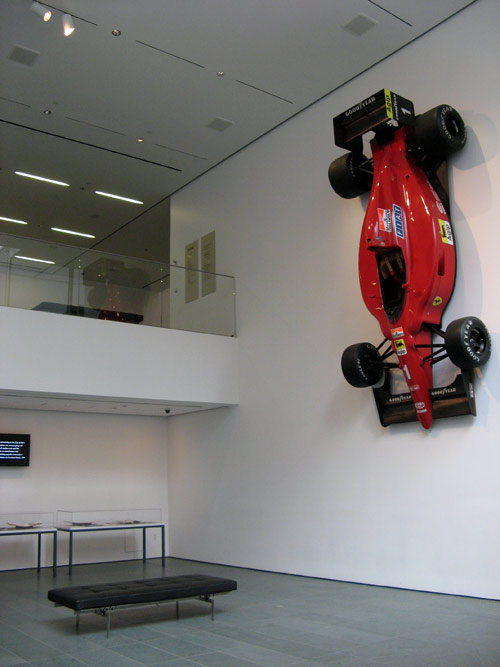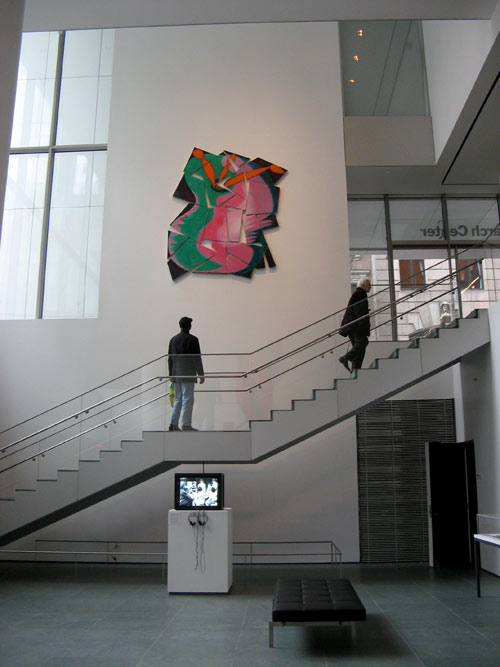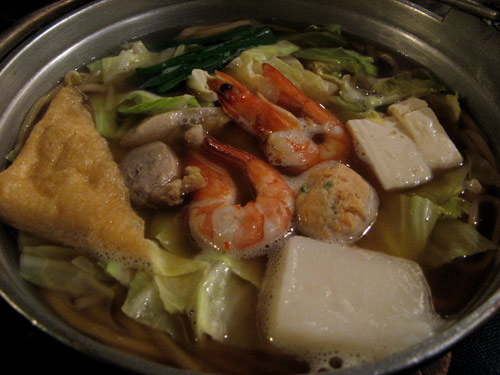What a doll
Attended one of the “Brown Bag Lunch Lectures” at the Museum of Modern Art this afternoon.
It was my first look inside The Lewis B. and Dorothy Cullman Education and Research Building, which opened in late-November 2006. The eight-story, 63,000-square-foot building marks the final element of Yoshio Taniguchi’s redesign project, increasing MoMA’s educational and research space fivefold. The expanded Library and Archives occupy the top floors; the glass-encased lobby and sixth floor open-air terrace offer views into the museum’s Sculpture Garden.


The subject this afternoon was painter Armando Reverón’s then-current retrospective, the first North American exhibit to focus on the Venezuelan early modernist. (Listen to the MoMA podcast here.)
The exhibit, comprised of some 100 landscape and figural paintings and objects, focused on 30 years of Reverón’s life, during which he worked and resided in the Venezuelan fishing village/resort of Macuto, on the Caribbean coast. He and his wife (and sometime model), Juanita Ríos, entertained many visitors at their home; during his life, Reverón actively cultivated an “eccentric artist” persona — reinforced in a couple of films — and grew to become something of a local attraction, where he produced pieces for the tourists that would make their way to the Northern coast.
Reverón dubbed his residence and workshop El Castillete, or “Tiny Castle,” which seems a bit grand based on the slidehow photos we were shown of the crudely constructed, palm-frond walled huts. The compound remained an attraction after the artist’s death in 1954 (in a psychiatric clinic where he was under treatment for schizophrenia); Ríos continued to live there until her death decades later. Ultimately, the castle was destroyed by the mudslides of Venezuela’s Macuto region that claimed the lives of 5,000-20,000 and the homes of 100,000 more in 1999.
Also discussed: the life-size dolls (muñecas) that Reverón used as models for his dream-like figural paintings. Sewn from stuffed burlap sacks and garishly wigged and made up, the dolls (each of whom had a name) were regular fixtures in the Reverón-Ríos home, where they were were outfitted and posed to greet visitors or provide silent companionship and artistic inspiration.
Lunch at Menchanko-Tei — not the best ramen in a city full of great ramen joints, but one of the best above 14th Street, and a great bargain in expense-account rich Midtown. There are about a dozen different noodle soup varieties on the menu from which to choose; I went for the house-named Menchanko, which arrived in a very hot cast-iron bowl, topped with chicken, whole shrimp, a salmon ball, tofu, vegetables and a single gummy rice cake.

There are no comments just yet.
Go for it ...
Search
Popular Tags
Categories
Archive
- July 2010
- July 2009
- January 2009
- November 2008
- September 2008
- August 2008
- July 2008
- June 2008
- May 2008
- April 2008
- March 2008
- February 2008
- January 2008
- December 2007
- November 2007
- October 2007
- September 2007
- August 2007
- July 2007
- June 2007
- May 2007
- April 2007
- March 2007
- February 2007
- January 2007
- December 2006
- November 2006
- October 2006
- September 2006
- August 2006
- July 2006
- June 2006